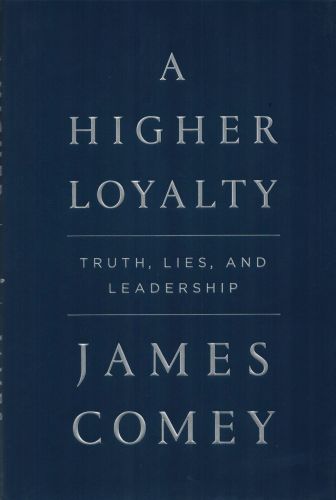

| A HIGHER LOYALTY Truth, Lies, and Leadership James Comey New York: Flatiron Books, April 2018 |
Rating: 5.0 High |
|||
| ISBN-13 978-1-250-19245-5 | ||||
| ISBN 1-250-19245-5 | 290pp. | HC | $29.99 | |
Though he started off in premed at the College of William and Mary, James Brien Comey switched to law and has devoted his entire career to law enforcement.1 As assistant U.S. attorney and later United States Attorney for the Southern District of New York, he prosecuted Mafia bosses and Martha Stewart. As deputy attorney general, he was instrumental in blocking the attempt of the G. W. Bush administration to authorize an illegal surveillance program called Stellar wind — a battle he describes in fascinating detail in this book. During his term as DAG, from December 2003 through August 2005, he appointed Patrick Fitzgerald as special prosecutor to probe the leak to the press of a CIA operative's identity. He describes that case also.
President Obama appointed him FBI Director in September 2013. In that role he presided over the investigation into Hillary Clinton's use of a private email server, and made the public statements that caused such uproar over outcome of the 2016 election. Here, he presents his justification for making those statements — a justification that seems to me credible.
Along the way he describes key events that shaped the later course of his life, sometimes in unexpected ways. But this is not a true memoir; Comey is more concerned with making the public aware of his perspective on events of the Trump administration that involved him. Here too his account seems credible. Although he reveals very little about the events themselves that was unknown, his thoughts and feelings and details of interactions in meetings are new; and they are a vital part of the picture. Comey comes across as being honest and even somewhat guileless — not necessarily an asset for a career in Washington, DC. But he handles himself well through the various contretemps, which suggests I may be reading him as more of a "Boy Scout" than he really is. One thing is clear: he did an excellent job of managing the FBI.2
James Comey has written a compelling narrative that, once started, pulls the reader along to the end. There are places where he jumps ahead of his chronology in disconcerting fashion, as when at the beginning of Chapter 6 he begins the tale of rushing to George Washington Hospital to support the ailing John Ashcroft against Alberto Gonzalez and Andrew Card in the Stellar Wind crisis. Then he diverts to describing routine events in the DAG job. I would have led off with the routine events. But I guess Comey was following his editor's advice to "punch up" the beginning of each chapter.
There are some puzzling omissions. On page 192, Comey tells us he was informed on 6 October 2016 of the discovery of Clinton emails on Anthony Weiner's laptop. Comey tells us that Weiner resigned from Congress in 2011, which prompts the question of why the emails weren't spotted sooner. But it was only in September 2016 that the FBI investigation of Weiner began — a fact Comey does not mention.3
Donald Trump's presidency threatens much of what is good in this nation. We all bear responsibility for the deeply flawed choices put before voters during the 2016 election, and our country is paying a high price; this president is unethical, and untethered to truth and institutional values. His leadership is transactional, ego-driven, and about personal loyalty. We are fortunate some ethical leaders have chosen to serve and to stay at senior levels of government, but they cannot prevent all of the damage from the forest fire that is the Trump presidency. Their task is to try to contain it. – Page 275 |
The bottom line is that this is a very readable book with few errors, a good index, and an essential message.

 To contact Chris Winter, send email to this address.
To contact Chris Winter, send email to this address.